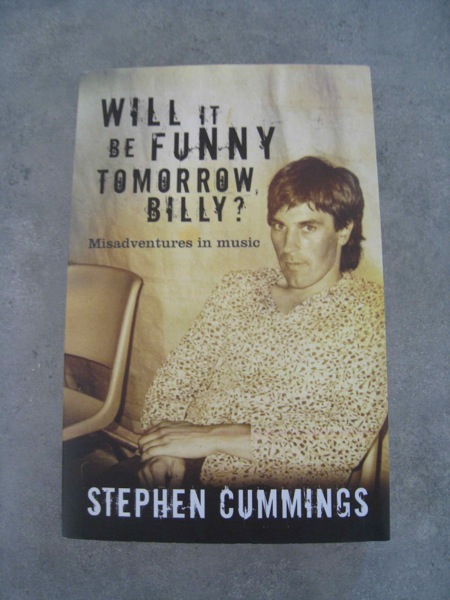Stephen Cummings Will It Be Funny Tomorrow, Billy?

A glance along the music section of Hughesy's bookshelves reveals they’re pretty light on for autobiographies. Plenty of biographies, discussions of genres, environments, labels and the odd volume of reminiscence, but not too much in the way of yer actual autobiography.
And looking at the autobiographies that are there as the exceptions we can formulate a rule around them,
Bob Dylan's Chronicles Volume 1 was widely applauded when it appeared a couple of years ago, and quite rightly so. The Bobster's work has spawned a significant chunk of publishing action over the years and it's hardly surprising that the man himself would be motivated to go to print and set a few things straight.
The particular approach he took, grabbing a couple of periods off his career's time line, discussing his recollections of them in some detail and consigning everything else to the maybe next time department meant that there'll be a queue lining up for Volume 2 and also allows the writer to skip over periods in his career that, for one reason or other he'd prefer to forget.
Or, indeed, could well have forgotten.
Searching For The Sound is the autobiography of Phil Lesh, bass-player with the Grateful Dead and notorious in some circles as the man who wanted the sound of solid air on Anthem of the Sun.
Given Lesh's background in serious contemporary music before he joined the Dead, their thirty-odd year career, associated lifestyle issues, a liver transplant and an on-going career where he works through the Dead's and a few other repertoires with a constantly changing lineup of musos, you'd expect the guy to have plenty to write about.
Joe Boyd's White Bicycles isn't really an autobiography as such, more a series of descriptions of Boyd's interactions with various performers and genres over the period between his adolescence and the time he headed off to head Warner Brothers film music department in the early seventies. as such it's as much about them as it is about him.
So, if they're the exceptions, what's the rule?
How about: The majority of musos are pretty ordinary people making their living more or less on a production line, so once you take out the sex and drugs (which for various reasons are probably a 'no go' zone) there probably isn't a whole lot that they can write about?
I was left pondering such considerations when I finished reading Stephen Cummings Will It Be Funny Tomorrow, Billy?, Cummings' more or less autobiographical account of his own misadventures in music.
Since The Sports were one of Hughesy's all-time favourite Australian bands, Cummings' previous excursions into the realm of fiction suggested that the guy can actually write reasonably well and I'd found his MySpace blogs reasonably interesting, I was looking forward to getting my hands on a copy to the extent that I bought over the internet rather than waiting till a trip to a major centre where there are actual bookshops where I might find a copy.
A career that only lasted a couple of years, four albums and a brace of EPs without reaching the heights of international stardom, means that Cummings was always going to be relatively light on for material when it comes to The Sports years, an issue he avoids at the beginning by going into his childhood and adolescence and the band's predecessors, the legendary Pelaco Brothers.
The remarkable part about Cummings' depiction of those early years is how absolutely unremarkable they were. You get the impression that here was another average suburban kid, born to working class parents who had aspirations for their offspring who got a kick along because he happened to grow up in Melbourne rather than anywhere else.
As a kid from the same era who read the same magazines (Cummings namechecks Go Set), saw some of the same movies (If...) and loved some of the same albums (Jeff Beck Group's Truth) much of Cummings' story seems rather familiar, although he's talking inner Melbourne, rather than any of the other Australian capitals or major regional centres.
It was a time when (apparently) virtually every suburban church hall or other suitable venue boasted a dance featuring one or more of the endless succession of groups you glimpsed in the pages of Go Set.
Occasionally they ventured further afield, and I remember marvelling that someone like Mike Furber might appear at a teenage dance in Townsville when the reality was that he was just doing a variation on his regular thing, but doing it a couple of thousand miles away from home base.
Cummings, from the age of twelve, criss-crossed Melbourne, checking out bands and trying to avoid the Mod/Stylist v Sharpie brawls that erupted from time to time. From there, Cummings runs through his early years in the business with the Pelaco Brothers, the rise of The Sports and the reasons they failed to make it on the international stage (a mixture of Cummings’ neurotic ego, bad luck and the usual hurdles that get placed in the way of anyone who looks promising).
It’s hard enough to hit the big time as it is, and the historic landscape of rock music is littered with performers who could have been huge yet somehow failed to deliver on the promise that prompted someone to label them possibly the next big thing. One would suggest there’s not a lot of mileage to be had out of such stories.
Given the fact that The Sports split up back in 1981 and Cummings has maintained a reasonably low- to medium-profile career over the intervening twenty-eight years you could be forgiven for thinking that, really, there isn’t all that much to tell. Nevertheless Cummings manages to weave enough threads together to produce a book that’s easy to read, chatty in some places, catty in others, and while you’re not likely to learn anything of earth-shattering importance, it’s an interesting enough read.

